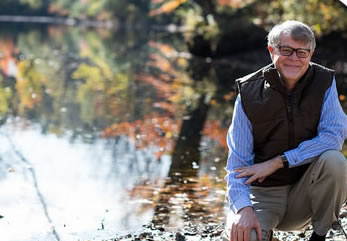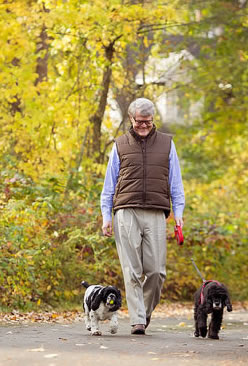Finding Hope in Hopelessness

~~Randy Hillard
When advances in care give patients new faith
One Rogel Cancer Center patient's story of treatment success when advances in care led to a new option for patients with metastatic stomach cancer
To Treat or Not to Treat
When Randy Hillard was diagnosed with stomach cancer in 2009 at age 59, he researched everything he could find about the disease. As a professor of psychiatry at Michigan State University, his status as a physician gave him access to the most current and up-to-date information.
"I read everything I could. Each thing made me more depressed than the previous one,"Hillard says.
Hillard underwent surgery at the University of Michigan Rogel Cancer Center, to remove the majority of his stomach, gallbladder and many lymph nodes. A small metastatic lesion was also found. He seriously considered not having further treatment and letting the disease run its course.
"As a physician with knowledge of medicine and oncology, Dr. Hillard was quite pessimistic about his future prior to, and at our initial visit," says Mark Zalupski, M.D., a medical oncologist within the gastrointestinal tumor program at the Rogel Cancer Center. "We discussed the relatively poor prognosis associated with advanced gastric cancer at that time."
Hope comes alive
Then the landscape of cancer treatment changed as a result of ongoing research and clinical trials. Right around the time of Hillard's diagnosis, a drug called trastuzumab was being studied in a phase III trial. The patients in the trial had advanced gastric cancer like Hillard. They also had a protein in their cancer called HER2, which is present in fewer than 20 percent of gastric cancers. The trial studied whether chemotherapy combined with trastuzumab was a more effective way to treat these patients than chemotherapy alone.

Doctors at the Rogel Cancer Center are working hard to find cures, but they can’t do it alone. Patients play a vital role in finding better ways to treat cancer by participating in research studies, also known as clinical trials.
Call 800-865-1125 to see whether a clinical trial is right for you.
It was. Trastuzumab had been used for a decade to treat breast cancer, but now was approved by the U.S. Food and Drug Administration to treat gastric cancer when HER2 was present. Hillard had advanced gastric cancer and testing showed his cancer had the HER2 protein. Not only did he qualify to take the drug, his insurance covered the costs.
"At that time, I decided that if I wasn't in hospice care a year from now, I'd become a hospice doctor," Hillard said. "I've always been interested in end-of-life care. I also decided to start support groups for people with stomach cancer."
Following recovery from surgery, a treatment plan was developed to include months of trastuzumab, aggressive chemotherapy and radiation. Hillard describes his time during his initial treatment as difficult. He had many side effects, especially from radiation, and took nine months off from his job as associate provost for human health at Michigan State. Since January 2013, he has continued receiving infusions of trastuzumab every three weeks.
"There were difficulties along the way, but his efforts have translated into a full recovery and an active and productive life," says Zalupski. "To this point, he has not had obvious progression or presence of the cancer over the past 34 months."
Moving Forward
As promised, Hillard now volunteers with hospice care in Lansing. To become an official hospice doctor, he plans to take his board certification exam this year. Additionally, he is the administrator for the Stomach Cancer Warriors and Caregiver Family support group on Facebook. Many people don't live near cancer centers like the University of Michigan, so the forum allows people to ask questions of other members on the group.
"Our general ethos is never give up," Hillard says. "Just within the last month, the 'C-word' for me is that maybe I'm cured. My scan at the end of September showed no evidence of disease and my lab tests are good. I feel perfectly well. It gives people in the group hope."
Until research provides more information, Hillard will continue to receive infusions of trastuzumab. His side effects are limited to minor peripheral neuropathy and "chemo brain," which leaves patients feeling less able to concentrate and multitask.
To rebuild his strength, Hillard walks his pair of cocker spaniels around his Williamston neighborhood. He returned to work at Michigan State in the fall of 2011 and has a new outlook on life. Describing himself as "taking things way too seriously" before his cancer diagnosis, he now feels happier than he's ever been.
He travels with his wife, Aingeal, and even went scuba diving in Curacao last summer with his chemo port in place. He also takes great pride in his collection of Chinese ceramics, a hobby that began in in the late 1980s when he attended the first Chinese/American psychiatric association meeting in Beijing.
Groups Randy Hillard has founded to fight stomach cancer and support patients and families:
- Stomach Cancer Warriors and Caregiver Family support group on Facebook:
https://www.facebook.com/IamCancerWarrior/notes#!/groups/152766261499442/ - East Michigan chapter of Debbie's Dream Foundation: Curing Stomach Cancer
- Campus Cancer Champions, a collaboration between the American Cancer Society and Michigan State University
Read the Winter, 2014 issue of Thrive.
